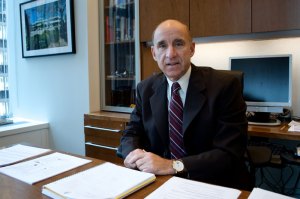 In April, former Centro Properties chief executive Glenn Rufrano took over the reins as Cushman & Wakefield’s president and CEO. In the two months since, the 60-year-old real estate veteran has embarked on a global fact-finding mission that has included visits to the firm’s offices in Europe, Asia, Canada and the United States. Mr. Rufrano sat down with The Commercial Observer to discuss what he’s learned so far; what advice his predecessor, Bruce Mosler, has offered; and his goals for the firm’s future.
In April, former Centro Properties chief executive Glenn Rufrano took over the reins as Cushman & Wakefield’s president and CEO. In the two months since, the 60-year-old real estate veteran has embarked on a global fact-finding mission that has included visits to the firm’s offices in Europe, Asia, Canada and the United States. Mr. Rufrano sat down with The Commercial Observer to discuss what he’s learned so far; what advice his predecessor, Bruce Mosler, has offered; and his goals for the firm’s future.
The Commercial Observer: Congratulations are in order. How have you been spending your first two months as chief executive officer at Cushman?
Mr. Rufrano: What I did at first was try to understand the depth of this organization from a geographic standpoint. So of the roughly nine weeks, I’ve been on the road five. I’ve traveled through Asia; I’ve been to London; I have to get to some other places in Europe. I’ve been through South America, up to Canada, and from the East Coast to the West Coast in the United States.
I haven’t hit everything I’d like to hit, but this is real estate, and if you’re a principal in real estate, you have to get out and kick the bricks. Unless you see the real estate, you don’t understand it; and, unless you go out and meet the people and understand the business lines we’re in, I don’t think you can fully appreciate the extent and the depth of the company on a global basis.
So, in other words, it’s been a meet-and-greet and a review of Cushman’s portfolio?
And meeting with people and understanding their relationships and their core competencies in their markets, and to get a sense of their stature in the marketplace. In each office I’ve gone to, I’ve met clients, too, so it’s getting an understanding of the breadth of Cushman & Wakefield’s dominance and its presence in those markets.
What have you learned so far?
We have a tremendous pool of talent, which differs in its ability to service clients across the world. For instance, when you go to Asia and you’re in Shanghai or Seoul or Beijing, they’re developing all over the place, which is a phenomenon we don’t see here. So we find a lot of Cushman & Wakefield people who are very conversant in development consulting and working with governments and owners to develop buildings. It would be a different practice than it would be in the United States, where we’re not developing buildings.
Here, we’re spending a lot of time leasing with our clients and tenants who have shorter-term leases; trying to find ways to benefit them longer term in a market that’s still just coming off the bottom; and from a capital market standpoint, finding capital for our clients. The difference is in how we’re working with our clientele across the globe based on what I would call de-linked economies that are at different phases of the marketplace.
That sounds like a particularly challenging factor to keep track of as head of a global real estate firm. In your mind, are there other challenges you see on the horizon?
It’s one of many. In the markets that are growing-the Asian markets are growing from a fundamental standpoint better than some of the European and U.S. markets-there’s a real opportunity. From my perspective, it’s just trying to understand how we’re servicing those markets and whether we have the right people and infrastructure in place to do that, which we seem to have.
You and former Cushman & Wakefield CEO Bruce Mosler have met, but don’t know each other very well. Did he give you any advice before you took the reins?
Bruce, as you know, has been around for a very long time. Where I would have more of a background on the principal side of the business, he has much more background on the brokerage side of the business. He’s been helpful in helping me understand some of the background of the people in the firm. He’s been here a very long time, and as the company has grown. He can help me understand how the pieces have been put together globally-where they work better, where they haven’t worked as well, where I should focus. He’s been very helpful with his background of the company and people, and in his depth of the brokerage market.



